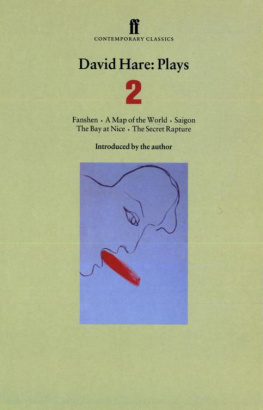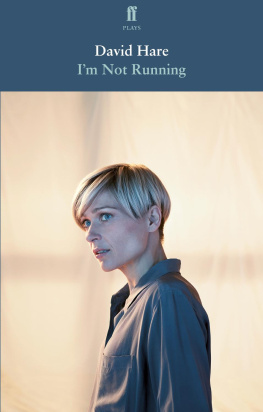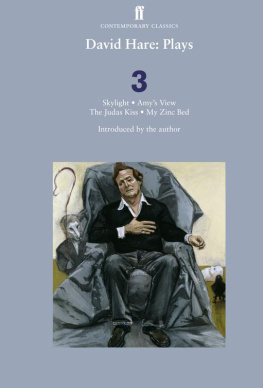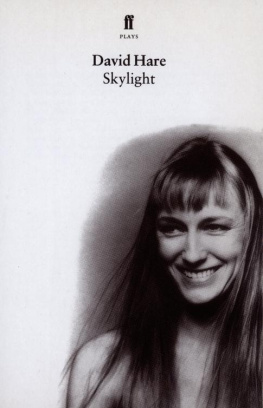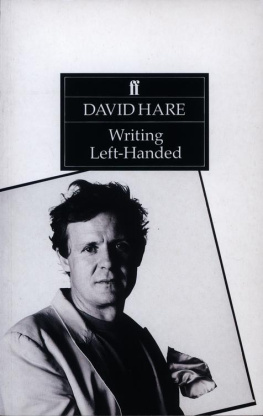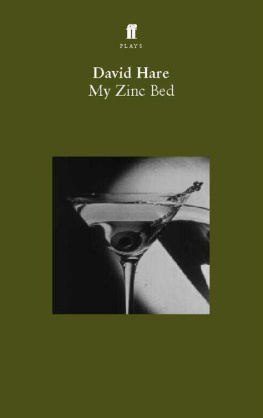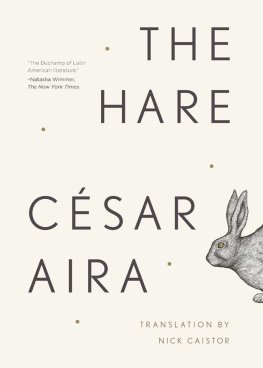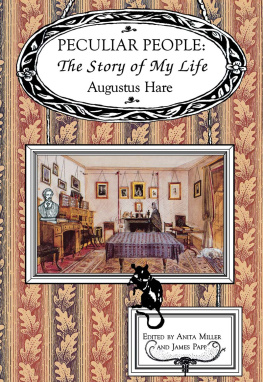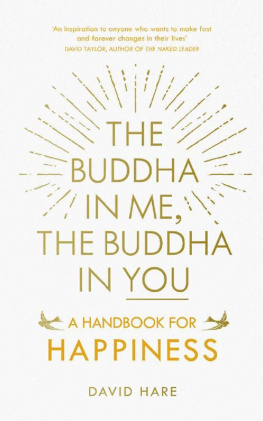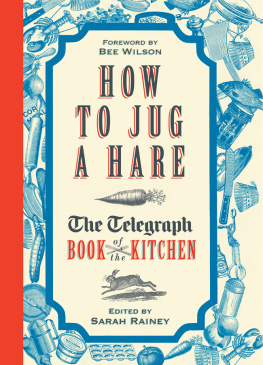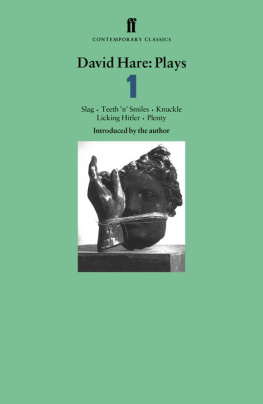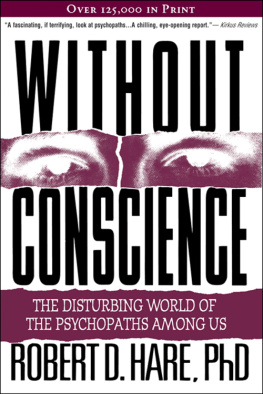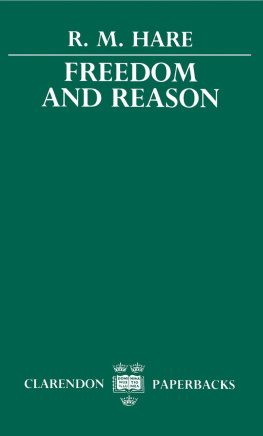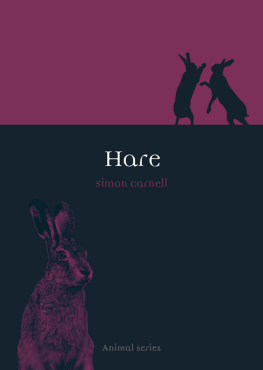Hare - David Hare Plays 2
Here you can read online Hare - David Hare Plays 2 full text of the book (entire story) in english for free. Download pdf and epub, get meaning, cover and reviews about this ebook. City: London, year: 2013, publisher: Faber & Faber, genre: Detective and thriller. Description of the work, (preface) as well as reviews are available. Best literature library LitArk.com created for fans of good reading and offers a wide selection of genres:
Romance novel
Science fiction
Adventure
Detective
Science
History
Home and family
Prose
Art
Politics
Computer
Non-fiction
Religion
Business
Children
Humor
Choose a favorite category and find really read worthwhile books. Enjoy immersion in the world of imagination, feel the emotions of the characters or learn something new for yourself, make an fascinating discovery.
- Book:David Hare Plays 2
- Author:
- Publisher:Faber & Faber
- Genre:
- Year:2013
- City:London
- Rating:4 / 5
- Favourites:Add to favourites
- Your mark:
- 80
- 1
- 2
- 3
- 4
- 5
David Hare Plays 2: summary, description and annotation
We offer to read an annotation, description, summary or preface (depends on what the author of the book "David Hare Plays 2" wrote himself). If you haven't found the necessary information about the book — write in the comments, we will try to find it.
David Hare Plays 2 — read online for free the complete book (whole text) full work
Below is the text of the book, divided by pages. System saving the place of the last page read, allows you to conveniently read the book "David Hare Plays 2" online for free, without having to search again every time where you left off. Put a bookmark, and you can go to the page where you finished reading at any time.
Font size:
Interval:
Bookmark:

TheeditorsatFaberandFabertalktotheauthorabouttheplaysinthiscollection.
Q: Youwrote Fanshen in1974fortheJointStockCompany.Itstheonlyplayofyourswhichisbasedonabook.
Yes. A couple of years before, Max Stafford-Clark and I had joined up with the producer David Aukin to form a travelling theatre company. The plan was to continue the work of Portable Theatre, which had recently gone bankrupt. Max then brought in William Gaskill from the Royal Court. Bill had always been frustrated at the Court that he couldnt create a genuine ensemble. Nor had he had time to do the exploratory work with actors that he so loved. So together he and Max began some casual evening workshops, using a book Heathcote Williams had written about the men and women you see speechmaking at Hyde Park Corner. After several months, they collected together this distinctive mix of written word, improvisation and direct observation, and mounted a wonderfully lively play called TheSpeakers. When I saw it, I knew they were on to something really exciting, and, quite simply, I wanted to be part of it.
Q: Sowas Fanshen youridea?
Not at all. The actress Pauline Melville had read William Hintons book and taken it to Gaskill, saying she thought it would make an interesting play. Bill was understandably daunted by it. Its a six-hundred page history of the experiences of one village during the land-reform programme that transformed China at the end of the 40s. It tells how a backward peasantry was given the chance to use techniques of public appraisal and self-criticism to take control of their own affairs. At the heart of it is the eternal question of how a democracy should police itself to ensure that it is genuinely democratic. Hinton was a farmer from a radical background. He was sent as a tractor technician from the US to help with the programme. Being a polymath, he had accumulated an extraordinary amount of detail. So it was with great caution that Bill gave me the book some time in 1974 and asked me if I thought I could make anything of it.
Q: IbelievetheJointStockmethodwastodoapreliminaryworkshopwithagroupofactorsandthentosendthewriterawayforaperiodontheirown.
Well, yes, thats what the method became. It was trial and error. As Joint Stock became more celebrated, so the method evolved. Like all good methods, it was flexible. Gaskill had run this countrys leading new play theatre. Max had also presented many living playwrights. So there was never any question of interfering with the authorship of the play. Actors and directors contributed, but they did not dictate. The workshop was there to enrich and inform the play, but it was not intended to provide you either with structure or dialogue. Of course as the writer, you were expected to argue for your point of view I remember the first reading of the finished play as a particular disaster and finding my back against the wall for several weeks after it but, finally, you knew you were working with people who had an almost moral sense of the supremacy of the playwrights imagination. From the perspective of the 90s, with the rise of directors theatre and the stultifying condescension of so-called writers workshops which are all the rage in the US and which consist mostly of directors who cant write interfering with playwrights who can its impossible not to be nostalgic for those days.
Q: Whentheplaywasfinishedandinperformance,WilliamHintoncameoverandinsistedonsomechangestothetext.
Yes. I had no problem with that. After all, the book had taken him fifteen years to write. His notes had been seized, first by the US Customs, then again by the Senate. When we had asked to make a play from his book, he had not expected us to succeed. Others had tried before and failed. But as soon as he read the reviews he was on the plane. He was a Marxist, and I wasnt. So, inevitably, there was some trading about emphasis. But I believe the final play achieves a classical balance.
Q: Anumberofcriticshaveobserved,however,that Fanshen isquiteunlikeyourotherplaysthatithasadistinctivetoneofvoice.Youwrotedifferentlyforthegroupthanwhenyouwroteforyourself.
Yes, I think thats fair.
Q: Theplayisfrequentlyrevived.Howdoesitplaynow,inthelessheadyclimateofthe90s?
Whats so interesting is that although you see it from a different perspective, it works just as well. Hintons book brilliantly foreshadows the questions which went on to grip all political leaders in the last part of the century. Can you have equity without abundance? How do you reconcile the demands of plenty and the demands of justice?
Q: Thisargument,ofcourse,carriesonin A Map of the World. WhywasthisplaypremieredinAdelaide?
I almost never do commissioned work. Like a lot of writers, I feel uneasy when asked to write to order. If you say anything at all in advance about a play youre planning, then you create an idea of it in the producers imagination. Theyre invariably disappointed when they dont get what theyre expecting. Its always seemed to me a playwright should work alone and in silence. That way, when you hand it in, its a gift, not a let-down.
Q: Butyoubrokeyourrulewiththisplay?
I liked Jim Sharman so much. He is the son of an Australian circus-owner and had directed JesusChristSuperstar. He had taken over the running of the Adelaide Festival for 1982. He wanted an American play from Sam Shepard and an English play from me, to run side by side. I had been very struck by reading something the Goncourt brothers said. Somewhere they express their admiration for medieval Japanese painters who, once they had perfected a style, not only started out on a new one, but actually changed their names when they did so. This way they hoped to avoid becoming what the brothers call prisoners of a reputation. It was irresistible for me to be asked to travel ten thousand miles to try and re-make myself into a different kind of playwright.
Q: A Map of the World almostoverflowswithsubjectmatter.
Perhaps I took on too much. A Martian visiting this planet would of course observe that a minority of us live in great luxury and comfort, and that the majority of us live in squalor and deprivation. Two-thirds of us have never made a telephone call. But I think they would also observe how few of us in the minority ever make any mention of these facts. The wretched of the earth are, for some reason, rarely thought to be a suitable subject for the arts. I was ambivalent about being able to represent the poor themselves. But I did feel qualified to write about our attitudes to them. The centre of the play is a debate in a Bombay hotel between a famous writer, Victor Mehta, who has an exquisite contempt for the crasser side of militant Third Worldism, and a young journalist, Stephen Andrews, who has an equally eloquent anger at peoples readiness to accept the world as it is. Almost any decent writer will recognize something familiar in Victors cultivated fastidiousness. And then the balance, I hope, is provided by Stephens well-grounded indignation.
Font size:
Interval:
Bookmark:
Similar books «David Hare Plays 2»
Look at similar books to David Hare Plays 2. We have selected literature similar in name and meaning in the hope of providing readers with more options to find new, interesting, not yet read works.
Discussion, reviews of the book David Hare Plays 2 and just readers' own opinions. Leave your comments, write what you think about the work, its meaning or the main characters. Specify what exactly you liked and what you didn't like, and why you think so.

